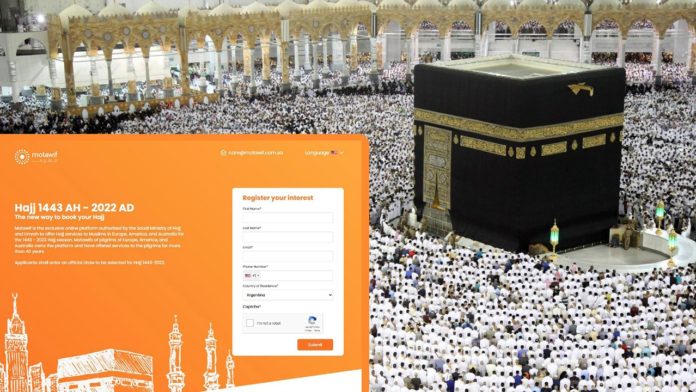Thousands of prospective pilgrims from the UK who were due to fly out for Hajj this month had their dreams shattered abruptly at the very last minute, including my family and I, writes Dilly Hussain.
Hajj being one of the five pillars of Islam is the biggest journey a Muslim can embark on outside of a legitimate jihad. Not fulfilling this obligation when you have the physical and financial means to do so is considered a major sin.
In February, my wife and I, along with my five siblings, made the intention and booked our Hajj with Amaana Tours. This would be the first visit to Allah’s house for all of us, so it was a huge decision we made as individuals and collectively as a family. Considering we were the first group of pilgrims outside of Saudi Arabia to make Hajj after two years of the COVID-19 pandemic, we knew we were amongst tens of thousands of prospective hujjaj waiting for this opportunity.
By the end of March 2022, we paid £53,065 to Amaana Tours (£7,580 per person) for an 18-day premium package, and were set to fly out on Thursday June 30. Covid vaccinations including boosters were done, as well as meningitis immunisations as they were mandatory requirements for our Hajj visas.
Going into Ramadan, we were mentally and spiritually preparing ourselves for the biggest journey of our lives; making amends with those who we’ve wronged, and wronged us, and settling any financial debts as directed and encouraged by the shariah. Alhamdulillah, we were informed towards the end of Ramadan that our booking had been accepted within the serial of Amaana Tour’s allocated quota for Hajj 2022 — all that remained was the issuing of our visas and flight details, which we expected would be given 4-5 weeks before our proposed departure date.
But as we approached the end of May, rumours started circulating online that Hajj operators have been left in the dark about booking confirmations by the Ministry of Hajj and Umrah for the issuing of visas and flight details, with the possibility that Saudi authorities were planning drastic changes to Hajj bookings for western pilgrims.
Following social media conversations and growing speculation as to why those who have booked and prepaid for their Hajj in full had not yet been contacted regarding their visas, I reached out to Amaana Tours and other prominent operators to enquire what the delay was about, and whether there was any truth to the rumours. To my surprise, I was told that they knew as much as I did, that the Ministry for Hajj and Umrah had indeed not been in touch regarding visas, and that they were not in a position to confirm or deny what was being discussed online, but to “remain hopeful and make dua” — which we as a family continuously did, until the first week of June.
Subscribe to our newsletter and stay updated on the latest news and updates from around the Muslim world!
The change
On Tuesday June 2, the rumours of major changes to Hajj bookings by the Saudi authorities that had been widely circulating for two weeks were finally confirmed. Haramain Info announced on their official Twitter account that: “A new online system and platform is expected to be launched by the Ministry of Hajj & Umrah within the coming week” — at that point I knew that the dreams of tens of thousands of hujjaj from the UK, and many more from the U.S., Canada, Australia and Europe, would be shattered.
 In addition to this, the Hajj and Umrah operator industry that Muslims had trusted and relied on for decades had just been put out of business overnight. Haramain Info also advised pilgrims who booked and prepaid for their Hajj to start requesting refunds — resulting in a chaotic scramble to refund thousands of hujjaj; an administrative nightmare since a portion of that money was already paid to hotels and other services in Saudi as deposits to preliminarily secure bookings, which is standard procedure.
In addition to this, the Hajj and Umrah operator industry that Muslims had trusted and relied on for decades had just been put out of business overnight. Haramain Info also advised pilgrims who booked and prepaid for their Hajj to start requesting refunds — resulting in a chaotic scramble to refund thousands of hujjaj; an administrative nightmare since a portion of that money was already paid to hotels and other services in Saudi as deposits to preliminarily secure bookings, which is standard procedure.
The overhaul to the traditional method of booking Hajj through tour guides and operators meant there was no consideration or preference to those hujjaj who had booked and paid in full months ago — this new online portal that would allow you to book directly with a single company of the Saudi government’s choice was now open to all.
For those wondering why this was a problem when the “money hungry operators” had been cut out of the equation — how fair was this to those who had made the intention to make Hajj back in February and March, prepaid in full, booked annual leave from work, made childcare arrangements, hastened to settle debts, mentally and spiritually prepared during Ramadan after being told they would be flying out in June?
How many of our elderly are not internet or tech savvy, and thus unable to complete steps such as uploading passport copies, headshot photos, and vaccination certificates from smart phones and laptops, let alone compressing files for this new portal? Or for those whose first language isn’t English or Arabic, and those who have no children to help them with this new online booking system, and would normally rely on operators and agents?
I say this to those who smugly celebrated this change at an unacceptable short notice because of their own bad experiences and grievances with operators, and those who held agents solely responsible for inflating the price of Hajj every year. The vast majority of Muslims who welcomed this change online were not making Hajj this year, and they were actually celebrating this change while criticising operators from the privilege of already having done Hajj.
Motawif
As thousands of prospective hujjaj nervously waited for the announcement of this new online portal system, at the same time thousands were also waiting to be refunded for their prepaid bookings by operators, on Monday June 6 the “Motawif” website had gone live for Western pilgrims to book their Hajj.
While Motawif describes itself as the “leading Hajj service portal,” it’s important to note that a Middle East Eye investigation revealed that an individual involved in helping facilitate millions of dollars’ worth of investments into Traveazy, the Dubai-based company that was exclusively contracted to process the western applications through Motawif, had ties to Indian Prime Minister Narendra Modi and his Islamophobic Hindutva Bharatiya Janata Party (BJP).
If this wasn’t concerning enough, rumours had also started circulating that sensitive data and documents of applicants would be shared with Saudi and Emirati intelligence services, as well as the Israeli spyware Pegasus being remotely installed on the phones of those who submitted their mobile phone numbers on applications. While these rumours cannot be substantiated, it’s unsurprising why such claims gained traction in light of Saudi Arabia and the UAE’s normalisation with Israel, and both country’s using Israeli spyware to crackdown on domestic dissent.
By the time Motawif’s online portal went live, my wife and younger brother sadly decided to pull out of the family Hajj due to the mass uncertainty pertaining to the price of packages, the duration of the trips, as well as the absence of entrusted people of knowledge they had hoped would guide them to fulfil their obligatory Hajj rituals — in short, they were unwilling to be post-Covid guinea pigs that will be experimented for this new system.
The moment of truth for supporters and critics of this new infrastructure had come. Would Hajj prices be cheaper or more expensive? How easy would it be to apply with all the relevant documents? Would it be first come first serve? Would group bookings be allowed or would people have to submit applications individually?
To answer some of these questions: Hajj prices initially appeared to be £800-£1500 cheaper compared to the average price of a premium package via UK operators. The packages also varied — there was a silver, gold and platinum package, and the silver package, which was the cheapest, didn’t include Madina, food at Mina, and while it offered a shorter 12-day trip, it automatically became a longer 16-18 day trip when selected. Group bookings of up to nine people were allowed, but Motawif also advised people on social media to submit individual applications to increase the chances of being selected for their random “draw.”
 But the above was merely the tip of the iceberg for the circus show that followed. Expectedly, the Motawif portal frequently crashed in the first 24 hours of going live.
But the above was merely the tip of the iceberg for the circus show that followed. Expectedly, the Motawif portal frequently crashed in the first 24 hours of going live.
Applications were lost after documents were uploaded because the site kept freezing due to high volume of traffic from across the western world, people were struggling with uploading documents because files had to be a particular size and format.
People were forced to enter a middle name to proceed with their applications, but were contacted later to amend their bookings because they inserted “none” or “NA” as their middle name. Pricing of packages wasn’t set or remotely accurate to what was initially displayed, with Motawif stating in their terms and conditions that prices would change subject to the hotels and flights selected by successful applicants. Hajj packages were not ATOL protected, meaning the security of getting your money back if anything went wrong with your booking was not there.
The refund process was unclear, but Motawif did state that if visas were rejected, an unspecified fee would be deducted from the total booking price. Their UK customer service helpline dialled out and most applicants weren’t able to speak to any advisors. Dozens of applicants claimed that Motawif’s customer service email responses were always generic and automated, and never specific to their applications or queries. People were being private messaged on Twitter and Instagram with automated messages like: “Assalamu Alaikum, you will receive an email soon, thank you for being patient. Motawif Team.”
A cursory glance at Motawif’s Instagram and Twitter pages will show hundreds of comments from disgruntled applicants complaining about everything I’ve stated above, and lot more. It would be a gross understatement to say that the entire booking process was a stressful and exhausting experience — it was absolute shambles from start to end, and an embarrassment to the noble responsibility of helping hujjaj. All this aside, my siblings and I persevered, and spent hours submitting our applications within 24 hours of the portal going live. We waited to hear back from Motawif about whether we were successful or not, which they said would be announced between June 15-18.
As we nervously waited, the uncertainty and lack of customer support from Motawif had dampened our mood. The abrupt last minute changes just weeks before we were due to fly out, the refund to our family booking that we made back in March, losing our place to go Hajj and now being subjected to a random lottery draw, not knowing how much we were expected to pay or for how long we’d be able to go for if selected, stole the positive spiritual energy away from our planned trip. I’d also be lying if I said that Shaythaan didn’t come to me, and planted doubts to cancel my Hajj all together, especially as legitimate concerns were being raised about the quality of support hujjaj would receive upon arriving in Makkah, if the management of their booking procedure was anything to go by.
 Come Wednesday June 15, Motawif started informing successful applicants to proceed with their bookings by selecting their packages, hotels and flights. That is when a new wave of issues had emerged. Successful applicants were now being told by Motawif that “packages were going fast” and to promptly select their desired options and make payment. It was widely claimed on social media by those who were successful that packages actually started from £9,000 up to £12,000, as opposed to £6,500-£7,000 as initially shown when submitting your application. When successful applicants made payments, the website would crash, or payments were accepted and processed, but people’s application status still showed “pending” or “amendments.”
Come Wednesday June 15, Motawif started informing successful applicants to proceed with their bookings by selecting their packages, hotels and flights. That is when a new wave of issues had emerged. Successful applicants were now being told by Motawif that “packages were going fast” and to promptly select their desired options and make payment. It was widely claimed on social media by those who were successful that packages actually started from £9,000 up to £12,000, as opposed to £6,500-£7,000 as initially shown when submitting your application. When successful applicants made payments, the website would crash, or payments were accepted and processed, but people’s application status still showed “pending” or “amendments.”
Again, a quick look at Motawif’s Instagram and Twitter accounts shows comments from successful applicants that were experiencing problems with making payment, or after making payment, they didn’t receive a confirmation of payment, and their online profile status had not updated to “approved” but the money was taken from their accounts. Screenshots from community Telegram and WhatsApp groups created to help hujjaj with this shambolic process were being sent to me informing me that many were unable to make payment after being successfully selected, or that money had been taken by Motawif without applicants receiving any confirmation of payments.
 While my siblings and I regularly checked our emails and kept logging into our accounts multiple times a day in the run up to Saturday June 18, which was the final day applicants would be informed whether they were successful or not, our morale had been seriously hindered. Hearing and seeing the plethora of issues faced by successful applicants, as well as knowing there’d be a major price hike if we selected a similar package to the one we initially booked with Amaana Tours, left us deflated. When Motawif announced on Saturday night that the draw selection was over, my siblings and I had a final check in our email, including junk and spam folders, and logged into our online Motawif portal — to find out that none of us had been selected from the draw.
While my siblings and I regularly checked our emails and kept logging into our accounts multiple times a day in the run up to Saturday June 18, which was the final day applicants would be informed whether they were successful or not, our morale had been seriously hindered. Hearing and seeing the plethora of issues faced by successful applicants, as well as knowing there’d be a major price hike if we selected a similar package to the one we initially booked with Amaana Tours, left us deflated. When Motawif announced on Saturday night that the draw selection was over, my siblings and I had a final check in our email, including junk and spam folders, and logged into our online Motawif portal — to find out that none of us had been selected from the draw.
While we were (and still are) gutted that this journey which we intended to make, booked, and paid for in full in March had been taken away, we accepted that it was decreed from the heavens that we were not destined to make Hajj this year. That said, there was also an unspoken sense of relief between us that the worries, concerns, uncertainty, and lack of reassurance that we were witnessing meant that we wouldn’t be victims to this new “system.”
What now for UK/Western Hajj Operators?
I want to just say a few words regarding Hajj and Umrah operators in the West. Many welcomed this change to an online portal, and some of their reasons were valid, which later proved to be invalid (namely with pricing). But many also supported this change due to personal bad experiences with rogue or unprofessional operators.
There are many Hajj and Umrah operators that have cheated and stolen from hujjaj over the years. But by Allah, there are so many more that actually delivered on their promises to hujjaj, honoured them by providing a great service of care, as well as educating millions of Muslims for decades. Amaana Tours for example is a company we as a family chose because we trusted them and had confidence in their competency, as their pristine track record is well-known. And there are dozens like Amaana Tours, big, medium, and small operators, who local Muslim communities have trusted for generations – whether they are English speaking, or cater for Sylheti Bangladeshis, Kashmiris and Punjabi Pakistanis, Indian Gujaratis, Somalis, Turks, Kurds, Arabs, and West Africans.
Yes, rogue Hajj and Umrah operators exist, old and new, and they will all have to answer to Allah (swt) for their deceit, but the very fact that third and fourth generation British Muslims like me still chose to rely entirely on a trusted operator, demonstrates the central need of reputable operators and tour guides. The outrage and blowback to the Motawif online portal system at such short notice, reflects how even an educated, English speaking, internet tech savvy generation would prefer to go with local groups, and people of knowledge of their choice, while absolving all administrative responsibilities to operators.
May Allah reward all the trustworthy, honest and dutiful Hajj and Umrah operators that served pilgrims from the UK and across the western world with the best in this life and the next, ameen. And may Allah hold those operators who lied, cheated, and defrauded hujjaj to account, ameen.
Who is to blame, and why did Saudi do this?
The question still remains as to why Saudi decided to steamroll ahead with this overhaul at such short notice, subsequently ending an existing infrastructure that included western Hajj and Umrah operators literally overnight, without warning. While a conclusive reason or explanation for this change hasn’t been provided by the Ministry of Hajj and Umrah, we can extrapolate a few possible reasons, irrespective of where you stand on the issue of the need for Hajj and Umrah operators in the West.
 For those who favour this change, it can be optimistically argued that a shift to an online system was inevitable, and was merely a case of “moving with the times” in the age of the internet, while also “protecting” hujjaj by cutting out middle men who only served an administrative role, but also allegedly contribute to manipulating and inflating Hajj prices.
For those who favour this change, it can be optimistically argued that a shift to an online system was inevitable, and was merely a case of “moving with the times” in the age of the internet, while also “protecting” hujjaj by cutting out middle men who only served an administrative role, but also allegedly contribute to manipulating and inflating Hajj prices.
On the other hand, it can be argued that the Saudis just got greedy, and wanted to make up for two years of not receiving that lucrative money spent by western hujjaj due to the pandemic, and knowing that Muslims wherever they are (but especially from the West) will pay whatever sum they have to, and book their place whichever way they have to, to visit Allah’s house and fulfil the obligation of Hajj.
While I appreciate that a move towards an online booking system might work in the near future, and may save costs and time if streamlined and implemented properly, I am personally of the opinion that the Saudi authorities pulled this move purely for monetary reasons, with full confidence that Muslim pilgrims will jump through whatever hoop they put in place to fulfil their religious duty, and any meaningful protest (let alone a boycott) against one of Islam’s foundational pillars is simply unforeseeable.
Whatever the case, I pray Allah makes it easy for those who had made plans to make Hajj this year, only for those aspirations to be destroyed in such a devastating way, ameen.
I pray Allah rewards the unsuccessful applicants who exhausted everything within their means of control with the reward of making Hajj, ameen.
Lastly, for those responsible for shattering the dreams and hopes of thousands of hujjaj this year, know that you will have to answer to Allah on the Day of Judgement, and to Him alone we seek refuge, and to hold you to account.

























